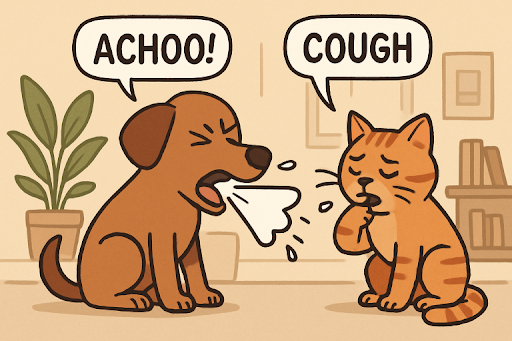Key Takeaways
- Understanding the various causes of coughing and sneezing in pets is essential for timely intervention.
- Common causes include infections, allergies, environmental irritants, and anatomical issues.
- Recognizing symptoms early can lead to more effective treatment and improved pet health.
Table of Contents
- Introduction
- Infections
- Allergies
- Environmental Irritants
- Anatomical Issues
- Foreign Bodies
- Heart Disease
- When to See a Vet
- Preventive Measures
Pet coughing and sneezing are common symptoms that can be distressing for both pets and their owners. Understanding what triggers these symptoms is key to ensuring your pet receives timely and appropriate care. Whether it’s an occasional sneeze or a persistent cough, the underlying causes vary widely—from mild irritants to serious health conditions. If your dog is showing respiratory symptoms, exploring the causes of dog coughing can be a vital first step in addressing the issue.
Recognizing and responding to coughing or sneezing signs can significantly impact your pet’s health. Knowing when to take action and the factors involved can help protect your pet’s well-being. Some cases may indicate underlying respiratory issues, allergies, or cardiovascular problems. Regular checkups, clean environment, and attention to detail, such as observing behavior and maintaining vaccination schedules, can help reduce the occurrence of these symptoms.

Infections
Respiratory infections are among the most frequent causes of coughing and sneezing in pets. Both viruses and bacteria can be responsible, affecting the upper or lower airways. Kennel cough, primarily found in dogs, is a classic example—a contagious disease often spread in crowded settings like boarding facilities and dog parks. The condition is usually caused by a combination of pathogens, with Bordetella bronchiseptica being a principal agent. Cats, meanwhile, are more susceptible to feline herpesvirus and calicivirus, both prominent causes of upper respiratory infections marked by sneezing, nasal discharge, and sometimes conjunctivitis. To learn more about how infections impact pets, refer to the ASPCA’s overview of common dog diseases.
Allergies
Just like humans, pets can develop allergies to environmental factors such as pollen, dust mites, mold, or even particular foods. Allergic responses generally manifest as inflammation of the airways, producing symptoms like repetitive sneezing, nasal congestion, watery eyes, coughing, and itchiness. Allergic rhinitis is more common in particular seasons when pollen counts are high, but it can also flare up with exposure to household dust or chemicals. Identifying and minimizing your pet’s exposure to these allergens can make a noticeable difference in their comfort and overall health.
Environmental Irritants
Beyond allergens, pets are vulnerable to a variety of household irritants. Common culprits include second-hand smoke, strong cleaning agents, perfumes, and aerosol sprays. These substances can be especially problematic for pets with preexisting respiratory conditions or sensitivities, often leading to acute episodes of coughing or sneezing upon exposure. Ensuring good indoor air quality with regular ventilation and switching to pet-safe cleaning products can help mitigate these issues.
Anatomical Issues
Some breeds are predisposed to congenital or anatomical respiratory tract issues. Brachycephalic breeds—such as Bulldogs, Pugs, and Persian cats—are especially known for their shortened nasal passages and elongated soft palates. These structural differences can cause noisy breathing, snorting, frequent sneezing, or a phenomenon known as reverse sneezing. While reverse sneezing is usually not harmful, it can sometimes alarm pet owners. If respiratory sounds are persistent or seem to cause distress, it’s wise to consult a veterinarian who can assess if surgical intervention might be necessary to improve airflow.
Foreign Bodies
Curiosity can sometimes get pets into trouble. Dogs and cats occasionally inhale small objects—such as grass blades, foxtails, or bits of toys—that become lodged in the nasal passages or throat. The body’s natural reaction is to expel the intruder through coughing, gagging, or persistent sneezing. If these symptoms appeared suddenly or your pet seems to be having trouble breathing, prompt veterinary attention is essential to safely remove any lodged material.
Heart Disease
Certain types of heart disease, especially in older pets, can also manifest with respiratory symptoms. Congestive heart failure may cause fluid buildup in the lungs, putting pressure on airways and leading to a persistent, sometimes soft, cough. This is most often seen in aging or small-breed dogs but can affect any pet with underlying cardiovascular issues. Early diagnoses and ongoing management of heart conditions can help reduce respiratory distress and improve quality of life.
When to See a Vet
While mild coughing or sneezing after exposure to dust isn’t usually cause for alarm, you should seek professional help if your pet:
- Coughs or sneezes persist for more than a week
- Has nasal or ocular discharge, especially if thick, colored, or bloody
- Shows labored breathing, wheezing, or open-mouth breathing
- Becomes lethargic, loses appetite, or shows other signs of systemic illness
These symptoms can indicate infections, blockages, allergies, or systemic illnesses needing immediate attention.
Preventive Measures
Preventing respiratory issues in pets is an achievable goal with consistent care and attention. Keep your pet’s vaccinations current and adhere to schedules for core vaccines that protect against major infectious agents. Maintain clean bedding, wash food and water dishes regularly, and avoid smoking or using strong chemicals indoors. Regular veterinary visits offer opportunities for early detection of emerging health issues and ensure that chronic conditions receive ongoing management.
By identifying the common causes of coughing and sneezing and staying alert for changes in your pet’s health, you can help keep your furry companions happy, comfortable, and breathing easy.





